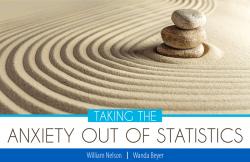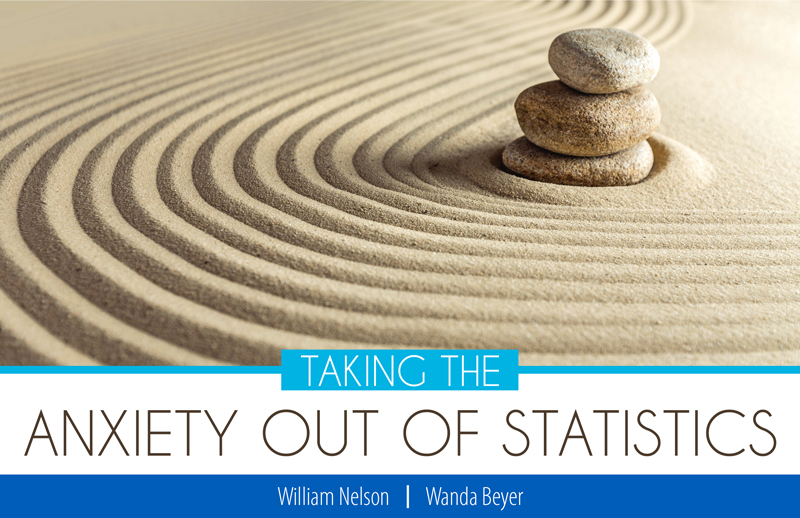Taking the Anxiety Out of Statistics
Author(s): William A. Nelson , Wanda Beyer
Edition: 1
Copyright: 2021
Taking the Anxiety out of Statistics is a fresh take on teaching the foundations of statistical inference. Unusual in the world of publishing, the eTextbook is coauthored by a biostatistician and an instructional designer. It is designed from the ground up to leverage the power of a digital format to foster active learning and explain core concepts through illustration rather than mathematical equations. Above all, the eTextbook is designed to be accessible. Accessible to students who are nervous about taking a course in statistics, and accessible to students who have diverse learning styles.
Highlights
- Multiple modes of delivery Content is delivered through text and various forms of multimedia such as videos, animations and illustrations. Lesson content is fully duplicated in text and video formats, which means that students can access the same content using the delivery format works best for them, or even both for reinforcement.
- Engagement through answering questions Lessons are taught from the perspective of being able to answer questions with each tool, which helps maintain engagement even when students are not interested in the inferential tools themselves.
- Real world examples Lessons are full of real-world examples and data that showcase how statistics is used to answer questions, and to illustrate the breadth of disciplines where statistics is found.
- Nothing extraneous Topics are carefully curated to build on each other and create a straight learning path from collecting data to drawing inferential conclusions.
Module 1: Overview of statistics
Module 2: Study designs and sampling
Module 3: Descriptive statistics
Module 4: Visualizing data
Module 5: Probability
Module 6: Sampling distributions
Module 7: Hypothesis tests
Module 8: Tests for numerical data in 1 or 2 groups
Module 9: Tests for categorical data
Module 10: Tests for two-way numerical data
Module 11: Tests for numerical data in 1-way categorical groups
Module 12: Tests for numerical data in 2-way categorical groups
William A. Nelson is a professor of Biology at Queen’s University in Ontario. He has taught introductory statistics for over 14 years and spent the last five years developing and teaching an award-winning multidisciplinary statistics course that teaches over 1000 BA and BSc students each year. His own research is in population biology, where he and his students do experiments and mathematical modeling to better understand why some insects have outbreaks while others do not.
Wanda Beyer is the Associate Director of Instructional Design and Curriculum Development in Arts & Science Online at Queen’s University. She has over 12 years experience in instructional design, development and delivery of online courses and professional development for new instructors. Wanda has authored several online courses, participated in research projects including the Blended Learning Retention Study in Statistics and a multidisciplinary team-based faculty support model.
Taking the Anxiety out of Statistics is a fresh take on teaching the foundations of statistical inference. Unusual in the world of publishing, the eTextbook is coauthored by a biostatistician and an instructional designer. It is designed from the ground up to leverage the power of a digital format to foster active learning and explain core concepts through illustration rather than mathematical equations. Above all, the eTextbook is designed to be accessible. Accessible to students who are nervous about taking a course in statistics, and accessible to students who have diverse learning styles.
Highlights
- Multiple modes of delivery Content is delivered through text and various forms of multimedia such as videos, animations and illustrations. Lesson content is fully duplicated in text and video formats, which means that students can access the same content using the delivery format works best for them, or even both for reinforcement.
- Engagement through answering questions Lessons are taught from the perspective of being able to answer questions with each tool, which helps maintain engagement even when students are not interested in the inferential tools themselves.
- Real world examples Lessons are full of real-world examples and data that showcase how statistics is used to answer questions, and to illustrate the breadth of disciplines where statistics is found.
- Nothing extraneous Topics are carefully curated to build on each other and create a straight learning path from collecting data to drawing inferential conclusions.
Module 1: Overview of statistics
Module 2: Study designs and sampling
Module 3: Descriptive statistics
Module 4: Visualizing data
Module 5: Probability
Module 6: Sampling distributions
Module 7: Hypothesis tests
Module 8: Tests for numerical data in 1 or 2 groups
Module 9: Tests for categorical data
Module 10: Tests for two-way numerical data
Module 11: Tests for numerical data in 1-way categorical groups
Module 12: Tests for numerical data in 2-way categorical groups
William A. Nelson is a professor of Biology at Queen’s University in Ontario. He has taught introductory statistics for over 14 years and spent the last five years developing and teaching an award-winning multidisciplinary statistics course that teaches over 1000 BA and BSc students each year. His own research is in population biology, where he and his students do experiments and mathematical modeling to better understand why some insects have outbreaks while others do not.
Wanda Beyer is the Associate Director of Instructional Design and Curriculum Development in Arts & Science Online at Queen’s University. She has over 12 years experience in instructional design, development and delivery of online courses and professional development for new instructors. Wanda has authored several online courses, participated in research projects including the Blended Learning Retention Study in Statistics and a multidisciplinary team-based faculty support model.

